

Malcolm Knowles, informal adult education, self-direction and andragogy. Contents: introduction · malcolm knowles – life · adult informal education · malcolm s. knowles on andragogy · self-direction · conclusion · further reading and references · links Malcolm Shepherd Knowles (1913 – 1997) was a, perhaps ‘the’, central figure in US adult education in the second half of the twentieth century.
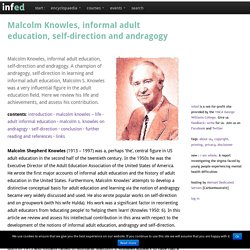
In the 1950s he was the Executive Director of the Adult Education Association of the United States of America. He wrote the first major accounts of informal adult education and the history of adult education in the United States. The Adult Learning Theory - Andragogy - of Malcolm Knowles. Malcolm Shepherd Knowles (1913 – 1997) was an American educator well known for the use of the term Andragogy as synonymous to adult education.
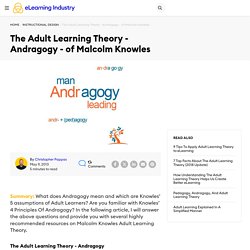
According to Malcolm Knowles, andragogy is the art and science of adult learning, thus andragogy refers to any form of adult learning. (Kearsley, 2010). The term andragogy can be supposedly equivalent to the term pedagogy. Andragogy in Greek means man-leading in comparison to pedagogy, which in Greek means child-leading. However, it should be noted that the term pedagogy has been used since the Ancient Greek times, while Alexander Kapp, a German educator, first used the term andragogy in 1833. Learning theory: models, product and process. Photo by Antenna on Unsplash Contents: introduction · what do people think learning is?
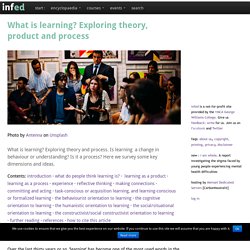
· learning as a product · learning as a process · experience · reflective thinking · making connections · committing and acting · task-conscious or acquisition learning, and learning-conscious or formalized learning · the behaviourist orientation to learning · the cognitive orientation to learning · the humanistic orientation to learning · the social/situational orientation to learning · the constructivist/social constructivist orientation to learning · further reading · references · how to cite this article See, also, What is education?
3.7 Analysing the strategic position of a business. Learning Concept. Unlearning Lessons 1 and 2. A Visual Guide to The Use of Google Books for Research. April 19, 2014 Google Books is one of the wonderful research tools I use when searching for books.
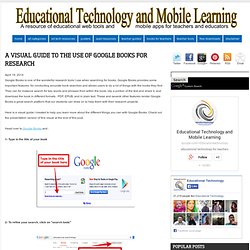
Google Books provides some important features for conducting accurate book searches and allows users to do a lot of things with the books they find. They can for instance search for key words and phrases from within the book, clip a portion of the text and share it, and download the book in different formats : PDF, EPUB, and in plain text. These and several other features render Google Books a great search platform that our students can draw on to help them with their research projects. Here is a visual guide I created to help you learn more about the different things you can with Google Books. Psychology of Learning. Learning Agility. Adult Learning Theory and Principles. Become familiar with Adult Learning Theory and the six principles of adult learning Adult Learning Theory Part of being an effective educator involves understanding how adults learn best (Lieb,1991).
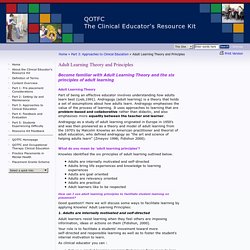
5 Questions To Drive Personal-Professional Learning. Image created by @GPearsonEDU using Canva.
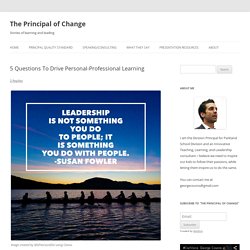
In a world where more and more people realize their voice matters, simply engaging people is not enough. People need to feel empowered in the process of work and learning. The shift from compliance to empowerment is essential in organizations today. With that in mind, how do we help people grow? The question is not, how do we motivate them, which is an entirely different idea.
Learning by Design The Learning by Design pedagogy uses eight ‘Knowledge Processes’.
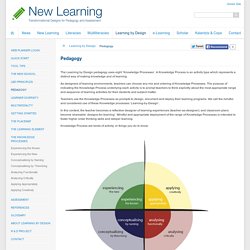
A Knowledge Process is an activity type which represents a distinct way of making knowledge and of learning. As designers of learning environments, teachers can choose any mix and ordering of Knowledge Processes. The purpose of indicating the Knowledge Process underlying each activity is to prompt teachers to think explicitly about the most appropriate range and sequence of learning activities for their students and subject matter.
The Lesson You Never Got Taught in School: How to Learn! A paper published in Psychological Science in the Public Interest evaluated ten techniques for improving learning, ranging from mnemonics to highlighting and came to some surprising conclusions.
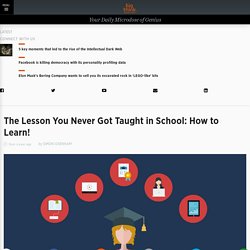
The report is quite a heavy document so I’ve summarised the techniques below based on the conclusions of the report regarding effectiveness of each technique. Be aware that everyone thinks they have their own style of learning (they don't, according to the latest research), and the evidence suggests that just because a technique works or does not work for other people does not necessarily mean it will or won’t work well for you. If you want to know how to revise or learn most effectively you will still want to experiment on yourself a little with each technique before writing any of them off. Elaborative Interrogation (Rating = moderate) A method involving creating explanations for why stated facts are true.
Learning theory: models, product and process. Donald Schon, AERA 1987, "Educating the Reflective Practitoner" We are in the midst of, in our cyclical American way, we are in the midst of a new wave of school reform, and as usual we are blaming the schools for issues that properly belong to the society as a whole.
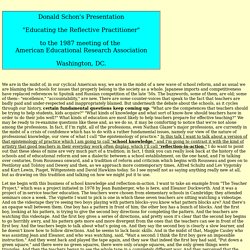
Japanese imports and competitiveness have replaced references to Sputnik and Russian competition of the late ‘50s. The buzzwords, some of them, are old; some of them-- "excellence," "accountability," are new. There are some counter-voices that speak to the fact that teachers are badly paid and under-respected and inappropriately blamed. But underneath the debate about the schools, as it cycles through our history, certain fundamental questions keep coming up: "What are the competences that teachers should be trying to help students, kids acquire? " David A. Kolb on experiential learning. Contents: introduction · david a. kolb · david kolb on experiential learning · david kolb on learning styles · issues · developments – jarvis on learning · a guide to reading · links · how to cite this piece As Stephen Brookfield (1983: 16) has commented, writers in the field of experiential learning have tended to use the term in two contrasting senses.
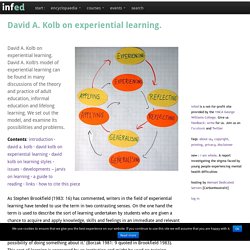
On the one hand the term is used to describe the sort of learning undertaken by students who are given a chance to acquire and apply knowledge, skills and feelings in an immediate and relevant setting. Experiential learning thus involves a, ‘direct encounter with the phenomena being studied rather than merely thinking about the encounter, or only considering the possibility of doing something about it.’
(Borzak 1981: 9 quoted in Brookfield 1983). The second type of experiential learning is ‘education that occurs as a direct participation in the events of life’ (Houle 1980: 221). David A. David A. David A. 10 Definitions of Learning. We all know that the human brain is immensely complex and still somewhat of a mystery. It follows then, that learning—a primary function of the brain—is understood in many different ways.
Here are ten ways that learning can be described. Literacy Professional Learning Resource - Key Concepts - AusVELS Levels 7 to 10 - Zone of Proximal Development and Scaffolding. Scaffolding: The theory There are three theorists in the field of Scaffolding. This section describes each of their theories in detail. Graph: Zone of proximal development: Vygotsky Scaffolding – Bruner Scaffolding in this context is learning through the joint construction of language and gradually withdrawing adult support as children master the language. It is extremely important that teachers foster patterns of talk that scaffold students to explore new ideas, learn things and move on to a new ‘zone of proximal development’ when children start school.
Knowles' Six Principles of Adult Learning - ACU (Australian Catholic University) Training and the Needs of Adult Learners. Needs of the Adult Learner In the early 1970s Malcolm Knowles introduced the term "andragogy," describing differences between children and adult learners (Knowles, Swanson, & Holton, 2005). Andragogy focuses on special needs of adult learners. How to Incorporate Principles of Adult Learning into Training. Setting Objectives and Providing Feedback. The 4 Big Reasons You Should Try Mobile Learning. The idea of implementing mobile learning into a course or instruction may be daunting for many educators. They may assume that mobile learning (aka m-learning) is too complicated and so decide to stick to the methods they have more experience with. Besides, the old fashioned methods of learning have worked for centuries, so what’s the need for change? However, the initial anxiety is quickly overcome once people realize the huge advantages that are gained from using m-learning .
Accessibility. 5 charts that explain the future of education. Children need to learn social and emotional skills if they are to thrive in the workplace of the future, a World Economic Forum report has found. The new research shows that as the digital economy transforms the workplace, Social and Emotional Learning (SEL) skills such as collaboration, communication and problem solving will become ever more important as more traditional roles are mechanized. With more than half of children now entering school expected to work in jobs that don’t yet exist, adaptability is becoming a core skill.
Social and Emotional Learning skills are those abilities that lie outside core literacies such as reading, writing and arithmetic. They allow creativity, problem solving and communication and have at their heart social interactions. Of 16 skills identified in the report as important for the 21st century, 12 are SEL. Students require 16 skills for the 21st century. A Step by Step Tutorial on How to Flip your Classroom with TED Ed. Below is a visual guide to walk you through the process of how to created a flipped lesson using TED Ed website. Plickers 2.0.
38 Question Starters based on Bloom’s Taxonomy - Curriculet. Curriculet is free for teachers and students. Bloom’s Taxonomy. Background Information | The Original Taxonomy | The Revised Taxonomy | Why Use Bloom’s Taxonomy? 6 Alternatives To Bloom's Taxonomy For Teachers - This post is updated from an article we published in April.
New ways to share in Google Drive and Classroom. Posted by George Reis, Software Engineer As more and more schools have started using Drive and Classroom, you’ve given us a ton of ideas about ways these tools can help you get more done, especially when it comes to who can share what within your school. 15 Expert Google Drive Tips for Teachers. By Jessica Sanders Google Drive makes your life easier and encourages collaboration and 21st century skill development among your students. Make sure you’re getting the most of out this free tool with these expert tips. 1. Use Google Docs templates. "We don't know what we don't know" - So what can we do about it?
In my work I often hear the following... We don't know what we don't know Seems fair enough, right? A Clever Trick to Play YouTube Videos without Distractive Features. YouTube is both a video resource for educational clips to use with your students in the classroom and also a robust video editor to work on your clips before you share them with the world. Recently some extra useful services have been added to YouTube such as creating presentations with audio embedded in them, and live streaming a Google Plus hangout. However, while YouTube is free for everyone to use, it comes with another cost.
Those annoying ads forced at you every time you want to watch a video together with the "recommended videos " for you, are part of the cost users pay for using the service. Kolb's learning styles, experiential learning theory, kolb's learning styles inventory and diagram. We have some very exciting plans for Businessballs. Later this month, we will be launching a new visual identity, refreshing the design of the site and adding lots of new functionality to enhance your learning experience. Pinterest. Game-based blended learning & classroom response system. Blended learning. Learning Theories, Learning Models, Learning Theory Summaries - in Plain English!
5 Common Misconceptions About Bloom's Taxonomy. High Order Thinking Chart. 7 Key Characteristics Of Better Learning Feedback. Student Centered Instructional Methods. Planting the seeds for the 702010 learning model in your organisation. Personal Learning Environments and the revolution of Vygotsky’s Zone of Proximal Development. Theory Into Practice (TIP) Experiential Learning. Training Design Manual : The Complete Practical Guide to Creating Effective and Successful Training Programmes. 1. Gagne's Nine Events of Instrction - How to Make A Lesson Plan. How to use Gagne's model of instructional design in teaching psychomotor skills.
Gagne's Conditions of Leanring. Quiz Dojo – Create Quizzes from Your PDFs. 16 Habits of Mind Essential for 21st Century Learners. Growth Mindset: Clearing up Some Common Confusions. Master the Art of Reading with Lewis Carroll’s Four Rules of Learning. Tips On How To Use The 6 Laws of Perception in eLearning. Google in eLearning Archives. 6 Ways To Use Drag And Drop Interactions In Your eLearning Course.
Richard Feynman: The Difference Between Knowing the Name of Something and Knowing Something. The 4 Rituals That Will Make You an Expert at Anything. Tips for Effective Facilitation « Ideas for Great Facilitation. Guided Reflection: How Can We Use Metaphor to Reflect on Learning in a Meaningful Way? How to think critically and analytically. 38 Question Starters based on Bloom’s Taxonomy - Curriculet. 35 Psychology-Based Learning Strategies For Deeper Learning. Critical Thinking Skills in Education & Life.
5 tips to improve your critical thinking - Samantha Agoos. Dropbox Education. Dl-finley-53-ways-to-check-understanding. Gold Standard PBL: Essential Project Design Elements. 4 Essential Rules Of 21st Century Learning. Blended Learning Definitions. Carolyn Perlini sur Twitter : "Delivering effective feedback to students:... How to Read a Book a Week. Re-reading is inefficient. Here are 8 tips for studying smarter. Academic Phrasebank. Master the Art of Reading with Lewis Carroll’s Four Rules of Learning. Learning Styles. Adult learning. Learning theories. Bloom's Taxonomy. What are the Intellectual Ideas Everybody Should Know? FE Skills Project.
4 Elements to Effective Adult Learning, According to Neuroscience. The ABC’s of Competency-Based Learning. The lesson you never got taught in school: How to learn! Learning Theories, Learning Models, Learning Theory Summaries - in Plain English! The Question Game: A Playful Way To Teach Critical Thinking. Differentiation Planning. 5 Questions To Drive Personal-Professional Learning. A Taxonomy of Reflection: A Model for Critical Thinking.
Professional Knowledge and Skills Base. The Inquiry Process, Step By Step. Academic Phrasebank. Academic Writing Module. Find the Right Words - Words To Use. Heutagogy and lifelong learning: A review of heutagogical practice and self-determined learning. Community of practice. Donald Schon (Schön): learning, reflection and change. 35 Psychological Tricks To Help You Learn Better.